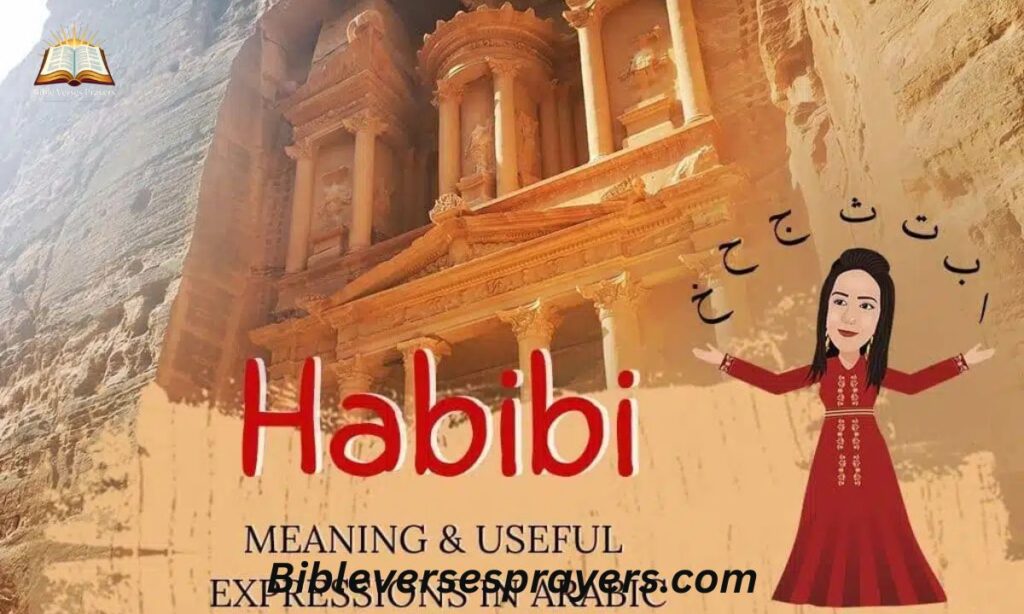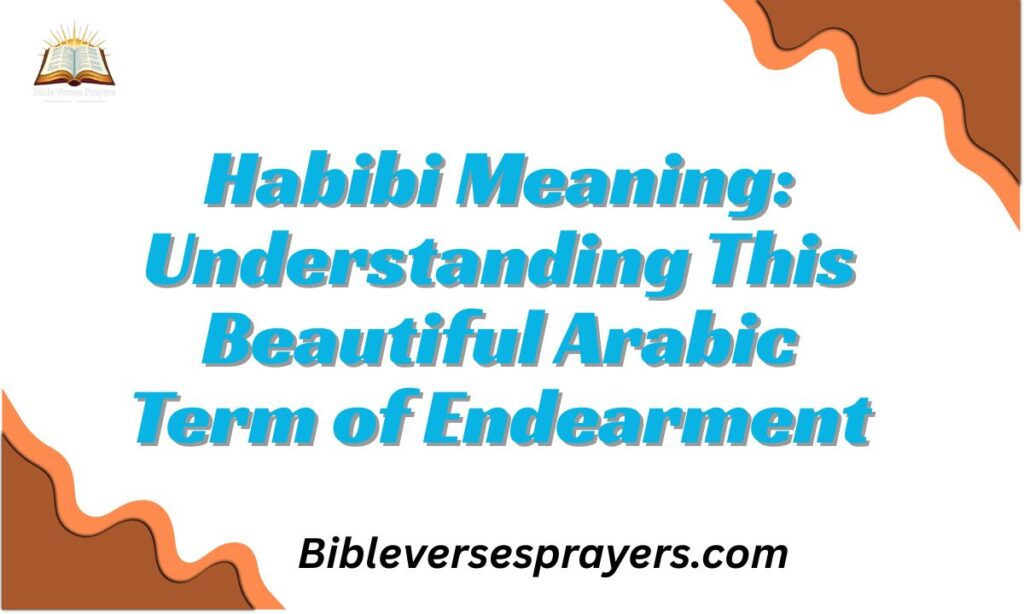Language connects us across cultures and continents beautifully. One Arabic word that has gained global recognition is “habibi.” You’ve probably heard it in songs, movies, or social media.
But what does this lovely word actually mean? Why has it captured hearts worldwide? Habibi is an Arabic term of endearment meaning “my beloved” or “my darling.” It comes from the root word “hubb” which means love.
The term is used throughout Arabic-speaking countries and beyond. It expresses affection, friendship, and warmth between people of all relationships.
1. What Does “Habibi” Mean?
Habibi is one of the most beautiful words in Arabic. It literally translates to “my beloved” or “my love.” The word expresses deep affection and care for another person. It’s much more than just a simple term of endearment.
The Literal Translation
The root word “habibi” comes from is “hubb” (حب). Hubb means love in its purest, most profound sense. The suffix “-i” at the end means “my” in Arabic. So habibi directly translates to “my love” or “my beloved.”
The word carries emotional weight beyond simple translation though. It encompasses feelings of warmth, care, and genuine affection. Arabic speakers use it to express closeness and connection. The term conveys a depth of feeling that’s hard to capture in English alone.
Understanding the linguistic construction helps appreciate its beauty fully. Arabic is a rich, poetic language with nuanced expressions. Habibi represents this linguistic elegance and emotional depth perfectly. It’s a word that sounds as beautiful as its meaning.
Masculine vs. Feminine Forms
Arabic is a gendered language with different word forms. “Habibi” (حبيبي) is the masculine form specifically. It’s used when addressing a male person directly. The pronunciation is “ha-bee-bee” with emphasis on the second syllable.
The feminine form is “habibti” (حبيبتي) pronounced “ha-beeb-ti.” This is used when addressing a female person specifically. The “t” sound distinguishes it from the masculine version. Both forms carry the exact same meaning and emotional weight.
Some people use “habibi” generically regardless of gender now. This happens especially in casual contexts or non-native speakers. However, using the correct gendered form shows cultural awareness. It demonstrates respect for the language’s grammatical structure and rules.
Different Contexts and Meanings
Habibi can mean different things depending on context and relationship. Between romantic partners, it’s an intimate term of affection. Among family members, it expresses familial love and closeness. Friends use it to show platonic affection and camaraderie.
In many Arab cultures, strangers even use it casually. A shopkeeper might call a customer “habibi” as friendly courtesy. This doesn’t indicate romantic interest at all—just warmth. The term creates a welcoming, friendly atmosphere in interactions.
The flexibility of habibi makes it incredibly useful socially. It can be serious or playful depending on tone. It works in formal and informal situations appropriately. This versatility is part of what makes it so beloved and widely used.
| Context | Meaning | Relationship Type |
| Romantic | My love, my darling | Partners, spouses |
| Family | My dear one | Parents, siblings, children |
| Friendship | My dear friend | Close friends |
| Casual | Friend, buddy | Acquaintances, strangers |
| Professional | Sir, friend | Service interactions |
2. Cultural Significance in Arab Countries
Habibi is deeply woven into Arab cultural fabric and identity. It reflects values of warmth, hospitality, and human connection. Understanding its cultural context helps appreciate its true significance and depth.
Expression of Hospitality
Arab culture is famous for its legendary hospitality worldwide. Welcoming guests is considered a sacred duty and honor. Using terms like habibi reinforces this welcoming spirit beautifully. It makes people feel valued and cared for immediately.
When someone calls you habibi, they’re extending warmth to you. It breaks down barriers between strangers quickly and effectively. This linguistic hospitality reflects deeper cultural values of generosity. Making others feel comfortable is a point of pride.
Shopkeepers, taxi drivers, and service workers use habibi regularly. This creates friendly, personal interactions instead of purely transactional ones. It humanizes everyday exchanges in meaningful ways daily. This is a distinctive feature of Arab cultural communication styles.
Family and Community Bonds
Family is central to Arab culture and social structure. Habibi reinforces these important familial bonds through daily use. Parents call their children habibi to express unconditional love. Siblings use it to show affection and closeness naturally.
The term extends beyond immediate family to broader community. Neighbors and community members use it to maintain social cohesion. This linguistic practice strengthens community ties and belonging feelings. It creates a sense of extended family beyond blood relations.
Using habibi maintains warmth in relationships over time and distance. It’s a verbal hug that keeps connections strong daily. This regular affirmation of care is culturally important and valued. It prevents relationships from becoming cold or merely functional only.
Regional Variations
While habibi is understood across Arabic-speaking countries, usage varies regionally. Gulf countries like UAE and Saudi Arabia use it extensively. Egyptian Arabic incorporates it into everyday speech very naturally. Levantine countries like Lebanon and Syria use it frequently too.
Some regions have their own variations and similar terms. “Ya albi” (oh my heart) is popular in some areas. “Ya omri” (oh my life) is another affectionate alternative used. These variations show the richness of Arabic expressions of affection.
Pronunciation and emphasis can vary slightly by dialect too. Egyptian Arabic might sound slightly different from Gulf Arabic versions. However, the meaning and sentiment remain consistent across regions. All Arabic speakers recognize and understand the term universally.
Modern Usage Evolution
In modern times, habibi usage has evolved somewhat from tradition. Younger generations use it more casually than previous ones perhaps. Social media has spread it beyond traditional contexts and boundaries. It now appears in memes, jokes, and internet culture regularly.
Some worry this casual use dilutes its traditional significance. Others see it as natural language evolution and adaptation. The term remains meaningful even as usage patterns shift. Its core essence of affection and warmth persists regardless.
Urban environments see different usage patterns than rural areas. Cities with diverse populations use it as a unifying term. It bridges different backgrounds and creates shared linguistic space. This adaptability ensures its continued relevance in changing times.
3. Habibi in Popular Culture and Media

Habibi has transcended Arabic-speaking communities to reach global audiences. Its appearance in music, movies, and social media has made it internationally recognized. This cultural export showcases Arabic linguistic beauty to the world.
Music and Songs
Arabic music frequently features habibi in lyrics and titles. It appears in love songs, pop hits, and traditional music. The word’s melodic quality makes it perfect for musical composition. Singers use it to express romantic feelings and emotions beautifully.
International artists have also incorporated habibi into their work. This cross-cultural musical exchange introduces the word to new audiences. Songs like “Habibi” by various artists have achieved global popularity. The word sounds exotic yet accessible to international listeners somehow.
The music industry has helped normalize habibi in global vocabulary. Young people worldwide recognize it from their favorite songs. This musical ambassador role is significant for Arabic language visibility. It creates positive associations with Arabic culture and linguistic beauty.
Movies and Television
Arabic films and TV shows naturally feature habibi throughout. It’s part of authentic dialogue and character interactions always. International audiences watching Arab media encounter it regularly now. This exposure educates viewers about Arab cultural expressions naturally.
Hollywood and international productions increasingly include Arabic terms too. When depicting Arab characters or settings, habibi often appears. This representation, when done respectfully, increases cultural understanding significantly. It normalizes Arabic language in global entertainment media landscape.
Streaming platforms have made Arab content more accessible globally. Netflix, Hulu, and others feature Arabic shows with subtitles. Viewers worldwide now hear habibi in context regularly and naturally. This accessibility is unprecedented in promoting linguistic awareness cross-culturally.
Social Media and Memes
Social media has exploded with habibi usage recently and virally. TikTok videos feature it in various creative contexts constantly. Instagram captions and comments include it regularly from all backgrounds. Twitter users incorporate it into jokes and relatable content naturally.
Meme culture has particularly embraced habibi with enthusiasm and creativity. Funny images and videos use it for comedic effect often. Sometimes it’s used accurately, other times it’s playful misuse. Either way, it increases familiarity with the term globally.
Non-Arabic speakers increasingly use habibi in their online communication. They adopt it as a term of endearment with friends. This cross-cultural adoption shows the word’s universal appeal clearly. It demonstrates how language can bridge cultural divides effectively online.
Celebrity Influence
Celebrities and influencers have amplified habibi’s reach significantly worldwide. Arab celebrities naturally use it in their content and posts. International celebrities learning Arabic often pick it up first. Their massive followings then encounter and adopt the term themselves.
Sports figures from Arab countries use habibi in interviews and posts. Football players especially have global platforms and diverse fan bases. When they use their native terms, millions of fans learn. This creates organic cultural education through entertainment and sports.
Fashion and beauty influencers from Arab countries showcase cultural pride. They incorporate Arabic terms like habibi into their international content. This normalizes Arabic language in mainstream influencer culture significantly. It challenges stereotypes and presents positive cultural representation beautifully.
4. How to Use “Habibi” Correctly
Understanding when and how to use habibi appropriately is important. While it’s a beautiful term, context and cultural sensitivity matter. Using it correctly shows respect for the language and culture it comes from.
Appropriate Contexts
Among close friends, habibi is perfectly appropriate and welcomed. It expresses genuine affection and strengthens friendship bonds naturally. Between romantic partners, it’s an intimate, loving term to use freely. Family members can use it liberally to express familial love.
In service interactions in Arab countries, you’ll often hear it used. Responding with a smile or “shukran habibi” (thank you, dear) is polite. This participates respectfully in the cultural exchange and hospitality offered. It shows appreciation for the warmth being extended to you.
Online among diverse communities, habibi has become more universally accepted. Using it with friends who understand its meaning is generally fine. It adds warmth and playfulness to digital communication effectively. However, consider your audience and their familiarity with the term always.
Situations to Avoid
In formal business settings, habibi may be too casual generally. Professional environments typically require more formal language choices usually. Unless you have an established casual relationship, avoid it initially. Let Arab colleagues use it first before reciprocating in workplaces.
Don’t use habibi with people you’ve just met unless they use it first. While Arabs might use it casually, non-Arabs doing so can seem presumptuous. Wait to understand the relationship dynamic before using intimate terms. Respect personal and cultural boundaries in all interactions always.
Using habibi mockingly or sarcastically is disrespectful and hurtful. It reduces a meaningful cultural term to a joke or stereotype. This perpetuates cultural insensitivity and can be genuinely offensive to many. Always use it sincerely or not at all—respect matters most.
Pronunciation Guide
Correct pronunciation shows respect and helps communicate clearly and effectively. “Habibi” is pronounced: ha-BEE-bee with stress on the middle syllable. The “h” is softer than English, coming from the throat slightly. The “i” sounds like “ee” in “meet” or “see” clearly.
For the feminine form “habibti,” pronounce it: ha-BEEB-ti with similar stress patterns. The “t” is a clear consonant before the final “i” sound. Practice saying it slowly at first until it feels natural. Arabic speakers appreciate the effort even if pronunciation isn’t perfect initially.
Listening to native speakers helps develop proper pronunciation skills effectively. Arabic music, videos, and language resources provide excellent examples. Mimicking native pronunciation shows cultural respect and learning commitment genuinely. Don’t be afraid to practice—most people appreciate the effort sincerely.
Cultural Sensitivity Tips
Learn the cultural context before using Arabic terms liberally everywhere. Understanding meaning is different from understanding cultural significance and weight. Research Arab culture to appreciate the depth behind words you use. This education prevents unintentional disrespect or cultural appropriation issues.
If you’re unsure whether to use habibi, simply ask respectfully. Most Arab people are happy to explain and teach. They appreciate genuine interest in their language and culture typically. This approach builds bridges rather than creating awkward misunderstandings later.
Avoid using habibi as a costume or party trick ever. It’s part of living language and culture, not exotic decoration. Treating it as a novelty diminishes its significance to native speakers. Use it genuinely to connect, not to seem cool or worldly artificially.
5. Learning Arabic: Beyond Habibi

Habibi is just one beautiful word in the Arabic language. Learning more Arabic opens doors to rich cultural understanding. The language contains countless expressions of beauty, poetry, and wisdom worth exploring.
Other Terms of Endearment
Arabic has many other beautiful terms of endearment to learn. “Ya albi” (يا قلبي) means “oh my heart” literally and affectionately. “Ya aini” (يا عيني) translates to “oh my eye” expressing preciousness. “Ya rohi” (يا روحي) means “oh my soul” showing deep connection.
“Azizi” (عزيزي) for males and “azizati” (عزيزتي) for females means “my dear.” “Hayati” (حياتي) means “my life” expressing how important someone is. Each term carries specific emotional nuances and cultural significance uniquely. Learning these enriches your ability to express affection in Arabic beautifully.
Parents use special terms for children like “ya omri” (my life). Grandparents might say “ya noor eini” (light of my eye). These generational terms show how language preserves cultural values. They teach children about love, family, and cultural identity naturally.
Benefits of Learning Arabic
Arabic is one of the world’s most widely spoken languages. Over 400 million people speak it as their first language. Learning it opens communication with diverse communities across continents. It’s also one of the official UN languages internationally.
Understanding Arabic provides access to rich literature and poetry. Classical and modern Arabic writing offers profound beauty and wisdom. Religious texts including the Quran are in Arabic originally. Academic study of Middle Eastern history requires Arabic knowledge often.
Career opportunities expand with Arabic language skills significantly today. International business, diplomacy, and journalism value Arabic speakers highly. The Middle East’s economic importance makes language skills valuable professionally. Cultural understanding that comes with language learning is equally important.
Resources for Learning
Many excellent resources exist for learning Arabic today conveniently. Apps like Duolingo, Rosetta Stone, and Babbel offer Arabic courses. YouTube channels provide free lessons from native speakers globally. These digital tools make learning accessible to anyone interested genuinely.
Language exchange programs connect learners with native speakers mutually. Websites like italki and HelloTalk facilitate these valuable connections. Practicing with real people accelerates learning and provides cultural context. These interactions create meaningful cross-cultural friendships often too.
Universities and community centers often offer Arabic classes locally. In-person learning provides structure and accountability many people need. Teachers can correct pronunciation and answer cultural questions immediately. The classroom environment creates community among fellow learners too.
Starting Your Arabic Journey
Begin with basic greetings and common phrases for practical foundation. “Marhaba” (مرحبا) means hello and is universally understood clearly. “Shukran” (شكرا) means thank you and is essential politeness. “Afwan” (عفوا) means you’re welcome and shows good manners.
Learn the Arabic alphabet early in your studies consistently. This opens reading and writing abilities crucial for progress. The script may seem challenging initially but becomes manageable with practice. Many learners find it beautiful and enjoyable to write actually.
Immerse yourself in Arabic media as much as possible daily. Listen to Arabic music, watch shows, and follow Arabic social media. This exposure trains your ear and builds cultural understanding naturally. Language learning is not just memorization—it’s cultural absorption and appreciation.
6. Habibi in Cross-Cultural Communication
As our world becomes more connected, cross-cultural understanding grows increasingly important. Terms like habibi facilitate this understanding when used respectfully and appropriately. They bridge cultures and create connections between diverse people beautifully.
Building Bridges Between Cultures
Using someone’s native terms shows respect and interest genuinely. It demonstrates willingness to meet people in their linguistic space. This gesture, though small, creates positive feelings and openness. It signals that you value their culture and identity sincerely.
Habibi has become a symbol of Arab culture’s warmth globally. When non-Arabs use it appropriately, it acknowledges this cultural gift. It shows appreciation for linguistic and cultural contributions Arabs make. This acknowledgment fosters mutual respect and positive relations cross-culturally.
Language exchange creates empathy and understanding between different groups. Learning why habibi matters helps understand Arab values around relationships. This deeper understanding combats stereotypes and prejudice effectively over time. Personal connections through language humanize cultural differences beautifully and powerfully.
Avoiding Cultural Appropriation
Cultural appropriation occurs when elements are taken without understanding or respect. Simply using habibi casually without cultural knowledge can feel appropriative. It’s important to learn the meaning, context, and significance first. This education transforms usage from appropriation to appreciation genuinely.
Give credit to the culture when sharing these terms publicly. Acknowledge that habibi is an Arabic word with cultural significance. This recognition honors the source rather than erasing it carelessly. It educates others while using the term yourself responsibly and respectfully.
Don’t profit from or commodify cultural terms without permission or understanding. Using habibi for marketing without cultural consultation is problematic clearly. Respect cultural ownership of language and expressions always fundamentally. Appreciation involves humility and acknowledgment of cultural origins consistently.
The Power of Linguistic Connection
Shared language creates immediate connection between strangers often magically. When someone uses your native term, you feel seen and valued. This emotional response transcends the word’s literal meaning significantly always. It creates warmth and goodwill that facilitates further connection naturally.
For Arab people living abroad, hearing habibi can be emotional. It connects them to home, culture, and identity powerfully instantly. Non-Arabs using it thoughtfully create moments of recognition and acceptance. These small acts of linguistic inclusion matter more than many realize profoundly.
Language learning and sharing creates a more compassionate world overall. It requires humility, curiosity, and genuine interest in others’ experiences. Habibi represents this possibility—a single word that brings people together. It demonstrates that our similarities outweigh our differences ultimately and beautifully.
Final Thoughts
Habibi is much more than just a word—it’s cultural expression. It embodies Arab values of warmth, affection, and human connection. Understanding it provides insight into a beautiful linguistic and cultural tradition. It represents how language can convey deep emotion succinctly and powerfully.
The global spread of habibi shows language’s power to transcend borders. It demonstrates how cultural exchange enriches all of us mutually. When used respectfully, it builds bridges between different communities effectively. It creates moments of understanding in our increasingly connected world daily.
Frequently Asked Questions
What is the exact meaning of habibi?
Habibi means “my beloved” or “my love” in Arabic. It comes from the root word “hubb” meaning love, and is used as a term of endearment across various relationships.
Can I use habibi if I’m not Arabic?
Yes, you can use habibi respectfully if you understand its meaning and cultural context. Use it sincerely with friends or in appropriate casual settings, avoiding mockery or cultural insensitivity.
Is there a difference between habibi and habibti?
Yes, habibi is masculine (used for males) while habibti is feminine (used for females). Both mean the same thing but follow Arabic grammar rules for gendered language.
Is habibi only used for romantic relationships?
No, habibi is used across all types of relationships. It works for romantic partners, family members, close friends, and even casually with acquaintances in Arab cultures.
How do you pronounce habibi correctly?
Pronounce it as “ha-BEE-bee” with emphasis on the middle syllable. The “h” is soft and throat-based, and both “i” sounds are like “ee” in “meet.”






